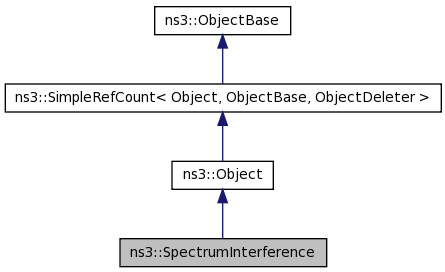ns3::SpectrumInterference Class Reference
#include <spectrum-interference.h>


Public Member Functions | |
| void | SetErrorModel (Ptr< SpectrumErrorModel > e) |
| void | StartRx (Ptr< const Packet > p, Ptr< const SpectrumValue > rxPsd) |
| bool | EndRx () |
| void | AddSignal (Ptr< const SpectrumValue > spd, const Time duration) |
| void | SetNoisePowerSpectralDensity (Ptr< const SpectrumValue > noisePsd) |
Protected Member Functions | |
| void | DoDispose () |
Detailed Description
This class implements a gaussian interference model, i.e., all incoming signals are added to the total interference.
Member Function Documentation
| void ns3::SpectrumInterference::AddSignal | ( | Ptr< const SpectrumValue > | spd, | |
| const Time | duration | |||
| ) |
notify that a new signal is being perceived in the medium. This method is to be called for all incoming signal, regardless of wether they're useful signals or interferers.
- Parameters:
-
spd the power spectral density of the new signal duration the duration of the new signal
| void ns3::SpectrumInterference::DoDispose | ( | ) | [protected, virtual] |
This method is called by Object::Dispose or by the object's destructor, whichever comes first.
Subclasses are expected to implement their real destruction code in an overriden version of this method and chain up to their parent's implementation once they are done. i.e., for simplicity, the destructor of every subclass should be empty and its content should be moved to the associated DoDispose method.
It is safe to call GetObject from within this method.
Reimplemented from ns3::Object.
| bool ns3::SpectrumInterference::EndRx | ( | ) |
notify that the RX attempt has ended. The receiving PHY must call this method upon RX end in order to: 1) know if RX was successful or not 2) free up resources that might eventually be used for the calculation of interference. Note that for this reason this method must also be called when RX is aborted.
- Returns:
- true if RX was successful, false otherwise
| void ns3::SpectrumInterference::SetErrorModel | ( | Ptr< SpectrumErrorModel > | e | ) |
set the SpectrumErrorModel to be used.
- Parameters:
-
e
| void ns3::SpectrumInterference::SetNoisePowerSpectralDensity | ( | Ptr< const SpectrumValue > | noisePsd | ) |
- Parameters:
-
noisePsd the Noise Power Spectral Density in power units (Watt, Pascal...) per Hz.
| void ns3::SpectrumInterference::StartRx | ( | Ptr< const Packet > | p, | |
| Ptr< const SpectrumValue > | rxPsd | |||
| ) |
notify that the PHY is starting a RX attempt
- Parameters:
-
p the packet corresponding to the signal being RX rxPsd the power spectral density of the signal being RX
The documentation for this class was generated from the following file:
- src/devices/spectrum/spectrum-interference.h
 1.6.1
1.6.1